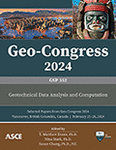Investigating the Potential of the Material Point Method to Model the Run-Out Behavior Observed in Centrifuge Experiments
Publication: Geo-Congress 2024
ABSTRACT
Improving the prediction of landslides and debris flow is essential to understand and mitigate the risks they pose. The material point method (MPM) is a hybrid Eulerian-Lagrangian approach that uses an Eulerian grid to compute the momentum and collisions while Lagrangian particles are used to track the material state. Thus, it is a methodology well suited to model large deformations without issues such as mesh distortion. However, while existing literature has demonstrated the potential of this method with comparisons to general observations from field data, there is a lack of validation against experimental data of run-out in the field of landslides. In this study, the results from recent centrifuge results idealizing a dam breach are used to illustrate the vastly different run-out behaviors fine-grained materials can show, ranging from static liquefaction and rapid run-outs to seepage and slope instability driven run-outs occurring at a much slower rate. Ultimately, the experiments showed that the state parameter, measured or inferred from CPTs, can be used to distinguish between the dominant deformation and failure mechanisms. This paper presents preliminary results from MPM analyses of element tests and small column collapses with a focus on material properties reflecting the state parameter. This motivates the use of MPM with constitutive models utilizing an effective stress-based interpretation of the material response to be applied to landslides, debris flows, and other run-out problems of civil engineering interest.
Get full access to this article
View all available purchase options and get full access to this chapter.
REFERENCES
Borja, R. I., and Andrade, J. E. (2006). Critical state plasticity. Part VI: Meso-scale finite element simulation of strain localization in discrete granular materials. Computer Methods in Applied Mechanics and Engineering, 195(37-40), 5115–5140.
Dafalias, Y. F., and Manzari, M. T. (2004). Simple plasticity sand model accounting for fabric change effects. Journal of Engineering mechanics, 130(6), 622–634.
Dong, Y., Wang, D., and Randolph, M. F. (2017). Runout of submarine landslide simulated with material point method. Journal of Hydrodynamics, Ser. B, 29(3), 438–444.
Fern, J., Rohe, A., Soga, K., and Alonso, E., eds. (2019). The material point method for geotechnical engineering: a practical guide. CRC Press.
Fávero Neto, A. H., and Borja, R. I. (2018). Continuum hydrodynamics of dry granular flows employing multiplicative elastoplasticity. Acta Geotechnica, 13, 1027–1040.
Hu, Y., Fang, Y., Ge, Z., Qu, Z., Zhu, Y., Pradhana, A., and Jiang, C. (2018). A moving least squares material point method with displacement discontinuity and two-way rigid body coupling. ACM Transactions on Graphics (TOG), 37(4), 1–14.
Hu, Y., Li, T. M., Anderson, L., Ragan-Kelley, J., and Durand, F. (2019). Taichi: a language for high-performance computation on spatially sparse data structures. ACM Transactions on Graphics (TOG), 38(6), 1–16.
Jefferies, M., and Been, K. (2015). Soil liquefaction: a critical state approach. CRC press.
Jiang, C., Schroeder, C., Teran, J., Stomakhin, A., and Selle, A. (2016). The material point method for simulating continuum materials. In ACM SIGGRAPH 2016 courses (pp. 1–52).
Lube, G., Huppert, H. E., Sparks, R. S. J., and Freundt, A. (2005). Collapses of two-dimensional granular columns. Physical Review E, 72(4), 041301.
Madabhushi, S. S. C., Follett, S. B., Martinez, A., Wilson, D. W., and Gallagher, B. (2022). Investigating the use of Centrifuge Modeling and miniature CPTs to Characterize the Run-Out Behavior of Fly Ash. Geo-Congress 2022, 1–10.
Madabhushi, S. S. C., Follett, S. B., O’Hara, K. B., Wilson, D. W., Kutter, B. L., and Martinez, A. (2023). Centrifuge Modeling of the Run-out behavior of Fly Ash Deposits Subjected to a Loss of Confinement. Canadian Geotechnical Journal. https://doi.org/10.1139/cgj-2022-058.
Madabhushi, S. S. C., Martinez, A., Wilson, D. W., andKutter, B. L. (2022). Design and Instrumentation of a Novel Centrifuge Container for Fly Ash Run-out Experiments. International Journal of Physical Modelling in Geotechnics, 1–32. https://doi.org/10.1680/jphmg.21.00044.
McDougall, S. (2017). 2014 Canadian Geotechnical Colloquium: Landslide runout analysis—current practice and challenges. Canadian Geotechnical Journal, 54(5), 605–620.
Pirulli, M., Barbero, M., Marchelli, M., and Scavia, C. (2017). The failure of the Stava Valley tailings dams (Northern Italy): numerical analysis of the flow dynamics and rheological properties. Geoenvironmental Disasters, 4, 1–15.
Wang, K., Yang, P., Hudson-Edwards, K. A., Lyu, W., Yang, C., and Jing, X. (2018). Integration of DSM and SPH to model tailings dam failure run-out slurry routing across 3D real terrain. Water, 10(8), 1087.
Xu, X., Jin, F., Sun, Q., Soga, K., and Zhou, G. G. (2019). Three-dimensional material point method modeling of runout behavior of the Hongshiyan landslide. Canadian Geotechnical Journal, 56(9), 1318–1337.
Yerro, A., Soga, K., and Bray, J. (2019). Runout evaluation of Oso landslide with the material point method. Canadian Geotechnical Journal, 56(9), 1304–1317.
Zhao, Y., Jiang, C., and Choo, J., (2023). Circumventing volumetric locking in explicit material point methods: A simple, efficient, and general approach. International Journal for Numerical Methods in Engineering. https://doi.org/10.1002/nme.7347.
Information & Authors
Information
Published In
History
Published online: Feb 22, 2024
ASCE Technical Topics:
- Centrifuges
- Construction equipment
- Continuum mechanics
- Debris
- Deformation (mechanics)
- Engineering fundamentals
- Engineering mechanics
- Environmental engineering
- Equipment and machinery
- Field tests
- Flow (fluid dynamics)
- Fluid dynamics
- Fluid mechanics
- Geohazards
- Geotechnical engineering
- Hybrid methods
- Hydrologic engineering
- Landslides
- Material mechanics
- Material properties
- Materials engineering
- Methodology (by type)
- Pollutants
- Solid mechanics
- Solid wastes
- Solids flow
- Structural mechanics
- Tests (by type)
- Wastes
- Water and water resources
Authors
Metrics & Citations
Metrics
Citations
Download citation
If you have the appropriate software installed, you can download article citation data to the citation manager of your choice. Simply select your manager software from the list below and click Download.
